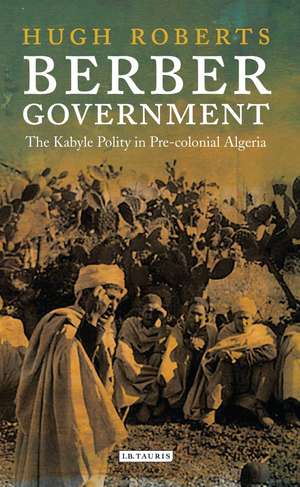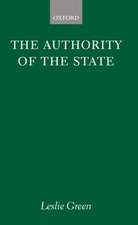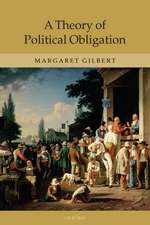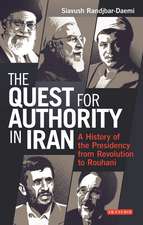Berber Government: The Kabyle Polity in Pre-colonial Algeria
Autor Hugh Robertsen Limba Engleză Paperback – 26 ian 2017
| Toate formatele și edițiile | Preț | Express |
|---|---|---|
| Paperback (1) | 220.29 lei 6-8 săpt. | |
| Bloomsbury Publishing – 26 ian 2017 | 220.29 lei 6-8 săpt. | |
| Hardback (1) | 774.62 lei 6-8 săpt. | |
| Bloomsbury Publishing – 18 aug 2014 | 774.62 lei 6-8 săpt. |
Preț: 220.29 lei
Preț vechi: 261.19 lei
-16% Nou
Puncte Express: 330
Preț estimativ în valută:
42.15€ • 43.92$ • 34.90£
42.15€ • 43.92$ • 34.90£
Carte tipărită la comandă
Livrare economică 03-17 aprilie
Preluare comenzi: 021 569.72.76
Specificații
ISBN-13: 9781784537661
ISBN-10: 1784537667
Pagini: 352
Ilustrații: 15 b&w integrated, 12 maps, 13 tables
Dimensiuni: 156 x 234 x 30 mm
Greutate: 0.48 kg
Editura: Bloomsbury Publishing
Colecția I.B.Tauris
Locul publicării:London, United Kingdom
ISBN-10: 1784537667
Pagini: 352
Ilustrații: 15 b&w integrated, 12 maps, 13 tables
Dimensiuni: 156 x 234 x 30 mm
Greutate: 0.48 kg
Editura: Bloomsbury Publishing
Colecția I.B.Tauris
Locul publicării:London, United Kingdom
Notă biografică
Hugh Roberts is the Edward Keller Professor of North African and Middle Eastern History, Emeritus, at Tufts University, USA, and a Visiting Professor in the Middle East Centre at the London School of Economics and Political Science, UK. He is also the author of The Battlefield: Algeria 1988-2002 (2017).
Cuprins
Chapter 1: Considering Kabylia Chapter 2: Economy and Forms of Settlement Chapter 3: Kabyle Law Chapter 4: The Kabyle Polity Chapter 5: Pre-colonial Kabylia and the Regency: Religion and Political Development, 1509-1639Chapter 6: The Rise and Fall of the Lords of Koukou Chapter 7: The Reconstitution of Greater Kabylia after 1640 Chapter 8: Transcending Kabylia: the Constitutional Tradition and the Exceptional Tradition
Recenzii
Shattering the views of Orientalists and nativists alike, this massively erudite and ruthlessly precise book takes the reader on an exhilarating detective hunt through barely-known sources, exposing a rich political history of Berber self-government that generations of researchers have missed. This is a landmark study that decisively changes the received wisdom on Berbers, Algeria, and the political history of the region. It is one of the best books I have read in Middle East Studies in recent years.
In Berber Government: the Kabyle polity in pre-colonial Algeria, Hugh Roberts brings to bear his unbeatable knowledge of Ottoman Algerian history and politics as well as his equally impressive gift for social theory. He provides a convincing map of the structures, legal system, and complex social networks that had generated a self-governing Kabyle Berber polity by the advent of French colonial rule
Thoroughly researched and well written, this much needed study fills an important gap in the history of the Berbers of Algeria. Roberts challenges the work of scholars such as Ernest Gellner and Pierre Bourdieu demonstrating that the Kabyle polity was much more complicated than they originally claimed. Dense in detail and comprehensive in structure, Roberts's fine contribution to the historiography of the area is indispensable reading for anyone interested in the development of political structures in the pre-colonial Maghreb and, more particularly, in the Kabyles of Algeria.
Hugh Roberts's book is sharp, exhaustive, detailed and poignant. It fills an important gap and its general point about the institutional richness of Kabyle politics (and the primacy of politics more generally) is made with devastating effect. The book does not just track and explain five hundred years of 'the Kabyle polity' (though it does that) but also explores the logic of how and why the polity transformed as it did when it did. There is no arguing from first causes or flaccidly conceived 'cultural tendencies'. Roberts alerts us to multiple possible readings of every turn of events, and marshals evidence for his way of understanding each one of them. What makes this intellectually satisfying is the way these are brought together, the way empirical rigor and sometimes bewildering specificity is rendered sensible via a broader logic of institutional forms understood and acted upon in particular cultural ways. Neither the culture nor material conditions explain political life. Political life is undertaken by political actors, whom we get to know through Roberts's description, and these actors employ the institutional resources available to them in culturally sensible ways in their historically specific moments. Eric Wolf long ago complained that European scholars conceive of Others as 'people without history'. Roberts's book is a potent antidote to that. I have not read anything like it.
In Berber Government: the Kabyle polity in pre-colonial Algeria, Hugh Roberts brings to bear his unbeatable knowledge of Ottoman Algerian history and politics as well as his equally impressive gift for social theory. He provides a convincing map of the structures, legal system, and complex social networks that had generated a self-governing Kabyle Berber polity by the advent of French colonial rule
Thoroughly researched and well written, this much needed study fills an important gap in the history of the Berbers of Algeria. Roberts challenges the work of scholars such as Ernest Gellner and Pierre Bourdieu demonstrating that the Kabyle polity was much more complicated than they originally claimed. Dense in detail and comprehensive in structure, Roberts's fine contribution to the historiography of the area is indispensable reading for anyone interested in the development of political structures in the pre-colonial Maghreb and, more particularly, in the Kabyles of Algeria.
Hugh Roberts's book is sharp, exhaustive, detailed and poignant. It fills an important gap and its general point about the institutional richness of Kabyle politics (and the primacy of politics more generally) is made with devastating effect. The book does not just track and explain five hundred years of 'the Kabyle polity' (though it does that) but also explores the logic of how and why the polity transformed as it did when it did. There is no arguing from first causes or flaccidly conceived 'cultural tendencies'. Roberts alerts us to multiple possible readings of every turn of events, and marshals evidence for his way of understanding each one of them. What makes this intellectually satisfying is the way these are brought together, the way empirical rigor and sometimes bewildering specificity is rendered sensible via a broader logic of institutional forms understood and acted upon in particular cultural ways. Neither the culture nor material conditions explain political life. Political life is undertaken by political actors, whom we get to know through Roberts's description, and these actors employ the institutional resources available to them in culturally sensible ways in their historically specific moments. Eric Wolf long ago complained that European scholars conceive of Others as 'people without history'. Roberts's book is a potent antidote to that. I have not read anything like it.














